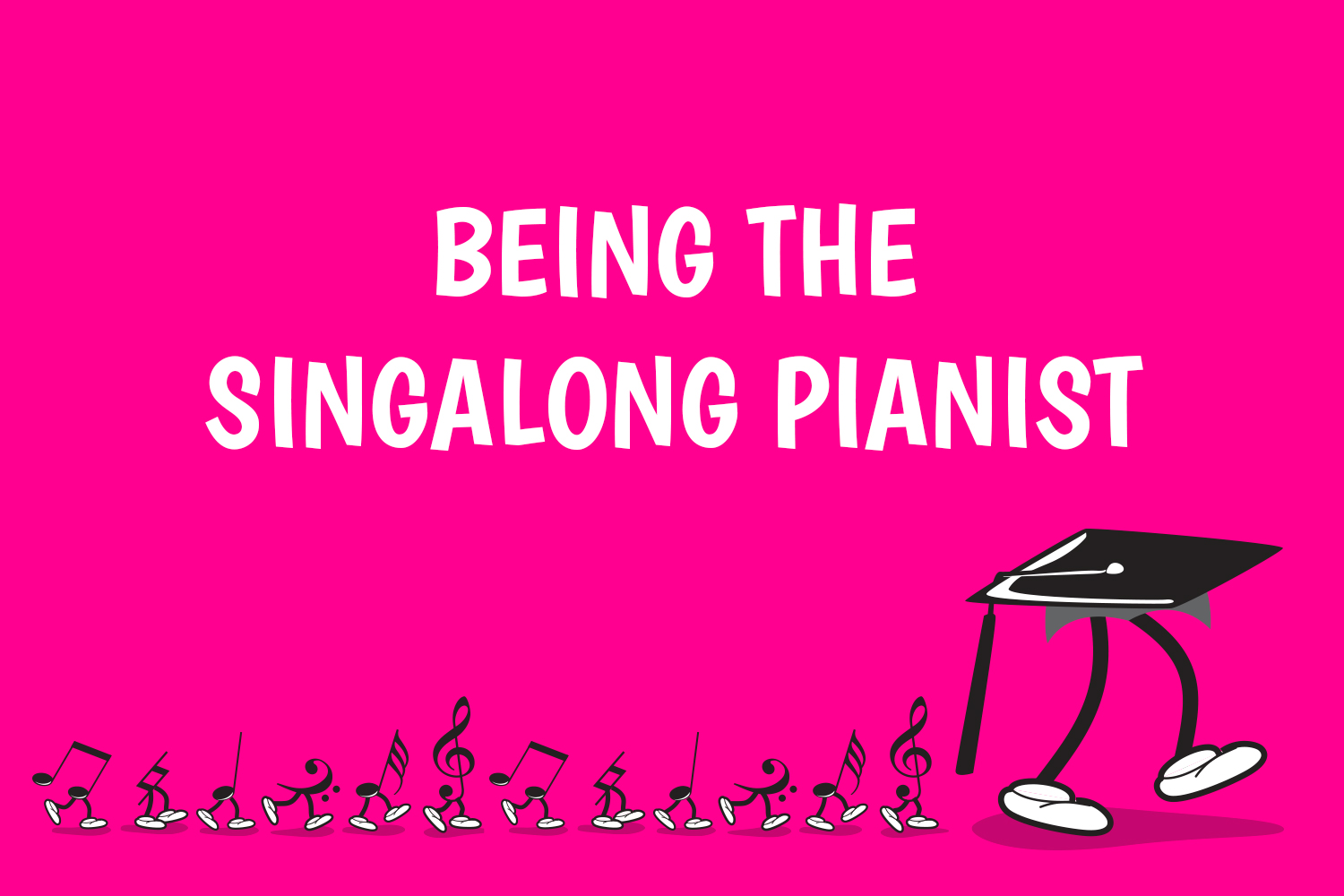Being the Singalong Pianist

(This is a special guest blog post by Janet Cheal)
Samantha, your recent webinar on ‘being a singalong pianist’ made me realize how very fortunate I have been! My most favourite, comfortable, ‘happy place’ and most exciting thing in the whole world to do, is to make a singalong happen.
Music goes back generations in my family. My grandparents, Nat and Frieda Reichelt, moved from Victoria (circa 1908) as newlyweds and were set up on a farm. Music was a very important part of my grandparents’ lives. For example, when shearing finished they would put on a party/dance in the shearing shed for the shearers and neighbours; Pop would play the piano accordion and others who could play an instrument, would join in. Nan told me that when a party was over in the early hours of the morning the family would all pitch in to clean up, put everything away, wash up from the sumptuous supper, all the while re-living the fun, re-telling the jokes and laughing about mishaps that occurred.
Because music was also so important to the women (including my mum) who married into the family, it was deemed essential to own a piano. Life on a farm was not easy in the 1940s, but my mum and dad worked hard, raising enough money to make sure that not only could we own one, but their brothers and sisters could too!
It was my dear Mum who introduced me to chords after I began formal piano lessons. I was picking out ‘Click go the Shears’ melody and she came into the lounge room and asked if I knew how to put chords with it. She showed me how some notes were like ‘good friends’ and go well together. When I’d got the hang of the keys of C, G, and F, she then showed me how to introduce the beat by breaking up the chords (little pinkie then two notes together), and eventually extending to an octave and chord of three notes etc. She never restricted my playing – I was allowed to just fiddle around for hours if I wanted to. Being the eldest of eight kids I often finished my dinner before everyone else, so she’d say ‘How about you go and play the piano for a little while’. All eight of us in our family were able to have music lessons. Dad was a great provider!
Years ago, I used to provide accompaniment for country talent quests and I was intrigued that I seemed to know how to play things I’d never heard before. Part of that comes from understanding instinctively about chords I guess, but I also wonder how much I was blessed by having a mother who, never having had the opportunity to learn music, taught herself. Born fourth in a family of eight, they just couldn’t afford more piano lessons, so the older sisters were expected to teach the younger ones. Almost everything Mum learned was by hanging around anyone who played and asking questions. By her late teens, she was known as an excellent pianist, but she couldn’t read music. That might have come as a shock to my dad when they married; they both came from musical families. On my grandparent’s farm, every Saturday night, the family and all the farmhands gathered around my Nan’s piano and my mum, Helen, played every song they wanted to sing. Mum fell pregnant with me very soon after they married, so I was doing Singalongs long before I was born! 🙂 (or at least listening to them).
One of the best gigs I ever had was at The Walkabout Hotel, Nhulunbuy (Gove), a mining town of about 4000 people in the Northern Territory in 1979-1980. When our four young children (aged 6 to 12) and I arrived in the mining town, we were met at the airport by my husband, Bill, who had preceded us by 6 months. One of the first things he said was ‘There’s a neat little piano in the Club Bar at the Walkabout. I can just imagine you playing there.’ My response was…’No way!’ On the second evening, Bill and I were taken for drinks at the Club Bar by my brother-in-law, John and his wife Barbara. John and Barb both loved music and of course, I couldn’t resist that dear little instrument. We finished up having a great night singing around the piano.
The next day, visiting the town shopping complex, I was shown the very important ‘Town Board’. Anything you needed people to know about – buying, selling, jobs, baby-sitting, meetings… anything at all anyone wanted known was written up and put on the board. There, in a central position, was a neatly typed up notice: ‘Wanted. Piano-player for the Club Bar. Contact the Walkabout Hotel.’ I guess it was their way of ‘finding’ the mystery player of the night before. I applied and got the job… Wednesday and Friday nights from nine to midnight. On the first night I began with ‘The Entertainer’ and then just played whatever I could think of. After an hour or so I noticed a tall, white-haired, distinguished-looking gentleman had not moved from his place against the wall not far from the piano. In a break he asked me in a heavy accent ‘Can you play ziss piece of music?’ and began to whistle ‘Jesu Joy of Man’s Desiring’ by J S Bach. My first thought was ‘What? In an outback, mining town pub? Bach????’ Anyway, I played it and it got a great reception; everyone clapped so I resolved to always include at least one classical piece. What wonderful nights we had and I shall forever remember the whole-hearted singing ‘Taaake me hoooorrm country roooads….. ‘ in so many accents. They used to try to think of songs I might not be able to play. Even the groundsman, one day when I went to practice when the bar was closed, said ‘ I’ve been trying to think of a song you wouldn’t know… I’ll bet you don’t know ‘On the baby’s knuckle or the baby’s knee, where will the baby’s dimple be?’ Yes… I know that one. 🙂
Samantha, your appreciation of being able to play along for people to enjoy themselves is lovely. I used to try to encourage my students to play ‘by ear’ using a well-known nursery rhyme or song they especially liked, first picking out the melody and then adding chords using the concept of ‘sets’ of chords, mainly by asking them if it ‘sounded’ right or not. I taught a man who was a wonderful veterinarian (I got to know him and his wife when I was rearing Jack Russell pups!). He was a brilliant classical pianist whose father was also a pianist but very tough on his son. He came to me for lessons; I wasn’t really sure why. One day I explained to him how to put chords with simple melodies and that there are patterns that give you clues… suddenly the penny dropped with a big thud. He GOT it!! The theory he’d learned for years suddenly made sense to him in making music. He was SO excited he leapt to his feet, said good-bye, rushed out the door and never came back. 🙂 I think he then found joy in music that he had not known before.
I am passionate about kids having fun with music. When I was having formal lessons, it was understood that you shouldn’t play anything apart from what your teacher had set for you… but mum didn’t know that and let me roam free. I believe it is this freedom that has resulted in skills I have today. I have had a ball all my adult life as I’ve played with rock n roll bands, country music, church music of all types, classical concerts, even playing for and helping produce the opera Carmen at Bourke in 1963. I am so grateful to my parents for the love and encouragement they gave us all, enriching our lives in so many ways through music.

“I am passionate about kids having fun with music.” — yes, the word “fun” is really essential, and in especially for children. Hopefully, more educators and parents would understand and be willing to make piano practice or music classes an enjoyable experience for the children (rather than following strictly the exam or competition “standard” repertoire).